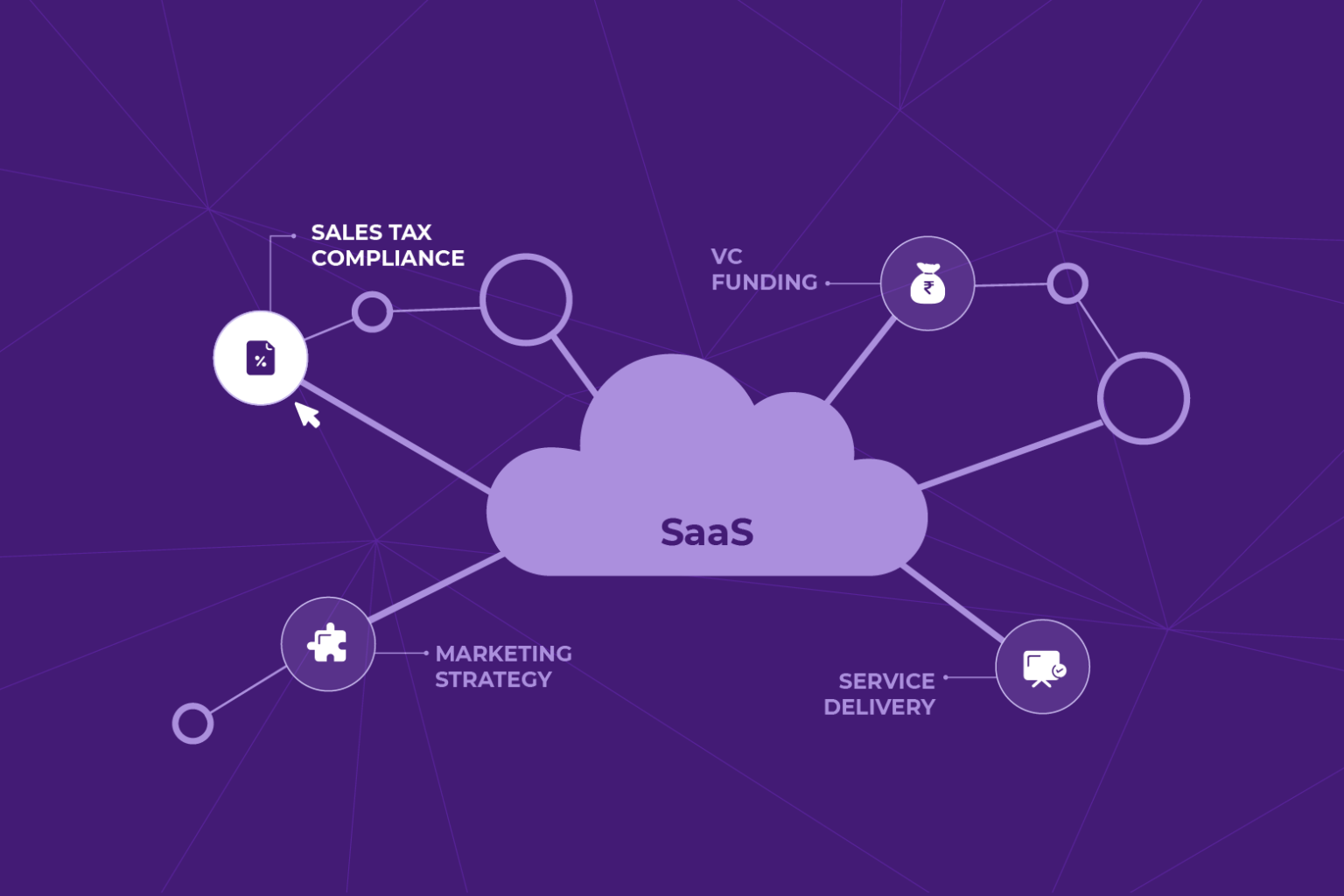Before the GST era, sales tax compliance was relatively easy to understand and comply with, states the World Bank[1]. Since the introduction of GST, there have been multiple policy updates. It resulted in technical as well as compliance issues for many Indian businesses. On the other hand, the rise in digitized services has become the key to sustainable business growth. This shift towards software and technology is no more an exception. It has eventually led to the emergence of numerous startups offering advanced SaaS solutions worldwide.
Today, we have many subscription-based software providers, popularly known as SaaS providers. With India heading for growth and innovation, the government anticipates becoming a $5 trillion economy by 2025[2]. Currently, the Indian SaaS market accounts for 2-4% of the global SaaS market, which is expected to reach 7-10% by 2025[3]. With this hypergrowth comes the toil to cope with the ever-evolving sales and use tax compliance.
Multiple challenges come along with adherence to the sales tax compliance requirements. We refer to it as the ETC challenge –
The ETC (Error | Time | Cost) Challenge
Researching, calculating, reporting, and filing returns to comply with tax laws is time-consuming, costly, and prone to errors. It’s often overwhelming for a SaaS startup owner to cope with the number of tasks. They seek zest on their upcoming funding from Angel Investors, curate the best-performing teams, and approach potential customers.
For a streamlined financial and operational workflow, massive startup collaborations have formed and are often called ‘third-party collaborations.’ It works by paying a recurring fee to use the software — whether a CRM tool, an accounting platform or a digital collaboration suite like Microsoft 365, Google Workspace or Slack. For technology vendors, SaaS collaborations allow quicker integrations and better customer experience.
Sky-scraping competition, however, compels these startups to invest more time in reinventing their core systems. It leaves behind very little time and resources to manage financial chores, especially sales tax compliance.
Top 3 reasons SaaS startups need a robust Sales Tax Compliance solution
Evolving GST regulations
Most new-age startups need help understanding what they could be losing due to non-compliance. Not limited only to penalties, non-compliance to sales tax can hit a Startup’s capital and assets. Moreover, it can also cost them the suspension of their GST registration as per the latest laws[4]. The introduction of GST on July 01, 2017, has helped the government to offer advanced services, giving cloud-based access to taxpayers. On the other hand, initiatives such as e-Invoicing help bridge the gaps in the entire sales tax compliance process.
With the refinement in the entire process, sales tax compliance has become even more vital for the survival of new-age startups. Between building their marketing strategies and creating brand awareness in the target market, SaaS startups often need more resources to invest in a designated Finance Officer or a finance team to oversee tax compliance. An automated sales tax compliance software helps in tax compliance’s timely and error-free management. Besides, it also offers updated solutions for all the advanced compliance requirements, for example – e-Invoicing under GST.
Coping with the innovative SaaS delivery models
Based on the type of problem a startup solves, the delivery of the solution varies. Companies in the past decade used to either build their software or buy licenses to operate third-party software. A startup’s tech stack has now become a combination of in-house solutions + SaaS solutions.
Each year, selling via subscription services has proven to be more profitable. It has resulted in increased invoices with increased financial data and errors in the accounting books. Sales tax automation helps in managing end-to-end compliance for startups.
Valuation and fund management
Private equity investments have substantially increased for Indian startups. If not yet funded, a startup with a promising technology solution will, at some point, need funding from venture capitalists. Both events drive the need for better and cleaner assets for fund evaluation and tax management.
Inadequate resources and insufficient expertise often result in high sales tax compliance costs. An automated tax solution enables startups to streamline the fund management process while complying with the latest regulations.
How Open streamlines the sales tax compliance requirements for SaaS startups
Streamlined invoicing and accounting
Customers worldwide seek newness in service delivery and hence keep exploring different platforms. It gives the new-age startups an excellent opportunity to approach and sell innovative and advanced services to a huge TG. Eventually, there is a rise in sales and respective invoices, even in an early phase. Now, aligning all the invoices date-wise for tax return filing purposes takes away a lot of time, leading to the need to hire dedicated resources. With OPEN’s invoicing solution, startups can create, manage and monitor all their existing and pending invoices from one place. It helps to save time that usually goes away in data consolidation, which businesses can further use for return filing purposes.
Auto-categorization under GSTR-1
After gathering all the necessary data, accurate information must be input into the tax forms. A review of the tax returns is essential to understand what is required and how it is presented. By creating or importing the sales invoices on OPEN, the invoice data gets auto-categorised under GSTR-1 and can be viewed under the Accounting and Taxes section on the Open dashboard. One can consider the cumulative tax and transaction value under the selected sections.
GSTR-1 filing and GSTR- 2A reports
The invoice data auto-populates on OPEN’s GSTR-1 dashboard for return filing purposes, which means there is no need to look for documents and old invoices to submit to the government portal for filing the returns. OPEN allows a startup to file GSTR-1 in 3 simple steps.
- Validated data for the auto-classified invoices
- Upload the selected invoices to the GSTN portal
- File GSTR-1 in no time
Moreover, one can view the summary of the GSTR-2A report on the OPEN dashboard in real-time.
Tax payments
How do startups usually pay taxes? General practice – They create a challan on the government portal for all their previously generated sales invoices. The government portal redirects them to the bank page to make the challan payment via available payment modes. There is, however, a more straightforward way to do it. They can create a challan directly on OPEN, wherein they get to make the payment instantly. Moreover, they can make the payment with their choice of payment mode. And it’s done!
OPEN also allows startups to make TDS payments directly by enabling TDS deduction while creating invoices.
e-Invoicing and e-Way Bill creation
According to the latest update from CBIC[5], businesses with a turnover over Rs.10 Cr. must generate e-Invoices starting October 1, 2022. It pulls evolved startups with the mentioned turnover to comply with the GST regulations. This initiative has been accepted to bring standardisation and uniformity in generating invoices. Yet, there still needs to be more clarity among startups on how to generate IRN, e-Invoices, the role of the QR code in the new way of generating invoices, and more.
With OPEN, startups can generate e-Invoices in a single click and convert their existing applicable invoices to e-Invoices. It enables them to develop, download, view, or cancel an e-Invoice from a single dashboard.
Sign up to explore the robust features on OPEN that help SaaS startups to stay on top of all the financial management challenges.
[1] GST – a complex tax system
[2] India becoming a $5 trillion economy by the year 2025
[3] Indian SaaS market expected to reach 7-10% by 2025
[4] Latest GST laws
[5] e-Invoicing updates by CBIC





